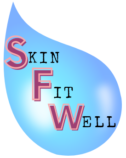Are you in the market for a cleanser for sensitive skin that will remove all cosmetics? Learn the facts to choose between micellar water and a cleansing oil.
Table of Contents
What is Double Cleansing?
Double cleansing involves using two cleansers preferably in your nighttime skin care routine. The purpose of this is to effectively remove skin care products, such as creams, makeup and sunscreen. The second cleanser is meant to remove any residual products, as well as actually cleanse the skin itself.
The first cleanser is most often a regular foaming cleanser, micellar water, cleansing oil, or a cleansing balm. The second cleanser is usually a foaming, gel or cream cleanser. Today, we are going to be delving further into micellar water and cleansing oils and their role as a first cleanser in skin care.
Micellar Water to Remove Makeup + Sunscreen
Micellar water is a liquid cleanser that resembles, well, water! It is very runny and usually clear, and can be used with or without a cotton pad as a first cleanse to remove makeup and sunscreen from the skin.
A 2017 study showed that micellar water is suitable as a cleanser for those with sensitive skin, in comparison to foaming cleansers (1). The topical use of micellar water promoted a temporary increase in skin moisturization for a period of 4 hours after application, while the foaming cleansers had presented a higher level of irritation to the skin (1).
Micellar water has been shown to be compatible with patients suffering from rosacea (2). Rosacea is a skin condition characterized by redness and patients may experience irritation from any physical stimuli on the skin. A reduction in symptoms, such as redness, were seen in patients after 8 weeks of including micellar water in their skin care routine (2).
Micellar water usually contains very gentle skin cleansers, known as surfactants. Examples include amphoteric surfactants, like disodium cocoamphodiacetate, which have a reduced charge on the surface, making it less aggressive upon contact with the skin (3). Gentle surfactants reduce skin irritation and redness.
Pros & Cons of Micellar Water

Cleansing Oil to Remove Makeup + Sunscreen
Oil cleansers involve the use of different oils, such as mineral oil, argan oil, or grapeseed oil to remove excess products on the skin before going in with a second cleanser. The cleansing oil needs to be massaged onto dry skin first in order to dissolve makeup and sunscreen.
To reiterate, finding a gentle cleanser is imperative to keeping your skin barrier intact. The more surfactants in a cleanser, the more potential for irritation and disruption of the skin barrier (3). Cleansing oils often contain gentler surfactants, like nonionic surfactants. These are surfactants that do not foam or lather well. They are ideal for use in cleansing oils as they can easily glide over the skin and emulsify when in contact with water, so the cleansing oil can be easily washed off.
One type of nonionic surfactant is polysorbate 80. Interestingly, this surfactant has been shown to minimize the amount of Staphylococcus aureus bacteria on the surface of medical devices (4). This shows that, albeit gentle on the skin, it is an effective cleansing agent.
It is also important to mention that emollient oils provide the skin with moisture. Therefore, cleansing with oils reduces skin irritation. In addition, cleansing oils have been shown to be more effective in removing waterproof sunscreen than regular foaming cleansers (5).The best part of cleansing oils? You can create your own, very effective cleansing oil WITHOUT any type of harsh surfactants. The use of pure mineral oil, grapeseed oil, sea-buckthorn oil or jojoba oil is sufficient to cleanse the skin and can be mixed together to gain benefits of each oil.
Mineral oil has been shown to increase skin hydration and softness when applied topically (6). Grapeseed oil has anti-bacterial, and antioxidant effects, and even improves wound healing in the skin (7). Sea-buckthorn oil is another great oil with many benefits you can read more about here. Jojoba oil plays a role in repairing the skin barrier and also has antioxidant effects (7).
Pros & Cons of Cleansing Oils

The Final Verdict
If you prefer a no mess method of removing makeup and sunscreen, try micellar water. However, you may experience irritation if you use it with a cotton pad. In addition, some micellar water cleansers contain harsh surfactants, so ensure to do your research before purchasing one. A full-proof method of removing all types of makeup, sunscreen, and waterproof skin care products involves the use of a cleansing oil. Ensure that the cleansing oil you choose is fragrance free and preferably contains a surfactant to help it wash off easily.
So, in reality, there are pros and cons to both micellar water and cleansing oils. There is no real winner, only personal preferences.
References
(4) Ueda, Y., Mashima, K., Miyazaki, M. et al. Inhibitory effects of polysorbate 80 on MRSA biofilm formed on different substrates including dermal tissue. Sci Rep 9, 3128 (2019). https://doi.org/10.1038/s41598-019-39997-3


Pingback: Why Your Oil Cleanser Is Breaking You Out - Skin Fit Well